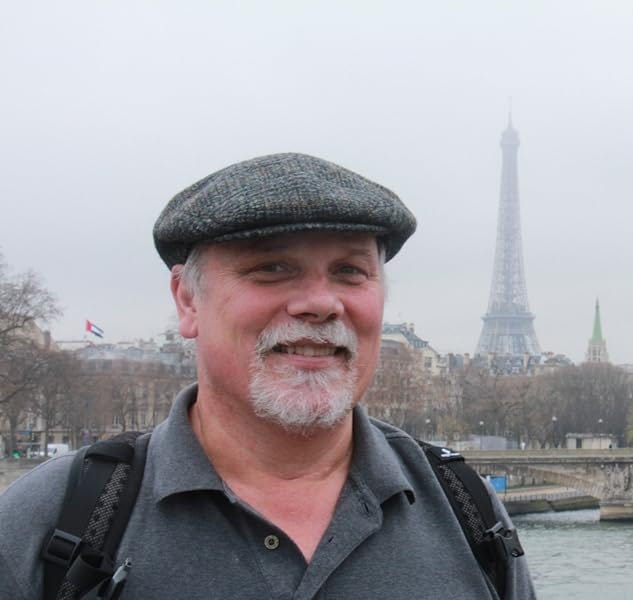Historical author Samuel Marquis wants you to use the strengths you've honed in your day job in your writing
On the practicalities of having two careers and developing the resilience to "climb mountain after mountain" in your writing exploits
Technically these show notes are for episodes that came out two weeks ago—prime evidence for why I say every year that “May is cray.”
What’s it like to know that your ninth great-grandfater is a renowned historical figure (in this case, Captain Kidd)?
How is it possible to be a parent, hold down a demanding full-time job, and build a successful career as an author?
How does being a scientist by day make you a better writer?
These, and many other fascinating topics are the things I learned from recent guest Samuel Marquis, author of twelve books that cross genres, including Blackbeard: Birth of America (which was a Kirkus Reviews Book of the Year), Soldiers of Freedom, and Lions of the Desert. Samuel’s newest book, Captain Kidd: A True Story of Treasure and Betrayal just came out and is about Samuel’s ninth great grandfather, legendary pirate Captain William Kidd. All told, his books have over 25,000 Amazon and Goodreads reviews.
By day, Samuel is a hydrogeologist and has served as an expert witness in several multi-million-dollar class action cases about groundwater contamination.
Listen to Samuel’s episodes:
Samuel Marquis, practical matters: Bringing the strengths of your day job into your writing
Samuel Marquis, inner stuff: Why villains are so fun to write (hint: it’s not because they’re evil)
Samuel Marquis, what’s next: Writing a book that’s historically accurate and sells well—with nods to Abraham Lincoln and Michael Keaton
Or, get the complete interview in one episode by becoming a paid subscriber and
supporting my work and becoming the recipient of my undying gratitude:
I had to learn to write. At first, I was like, I'm going to write what I know, which I wouldn't say you need to do, really. I think you've got to write what you love. It's a different thing.
We covered:
Building what he calls a “hybrid career” out of multiple interests (science, history, and writing)
The similarities between science writing and literary historical writing
Letting your early work stink
Developing your own voice
The importance of resilience, because building a writing career is like “climbing mountain after mountain”
Really fascinating insight on how geology and history are intertwined, and how having a scientific mind helps write history
Infusing historical writing with character development
Making time for everything when you have two jobs and a family (“I’m just always busy”)
Finding inspiration in your family tree
Why villains are so fun to write (hint: it’s not because they’re evil)
Empathizing with folks who lived centuries ago and did things that we consider to be horrible today (like attending a public hanging on your wedding day, which Captain Kidd and his wife did)
His least favorite part of the writing process
Dealing with the nagging fear that you’re not accurately portraying history
Looking for historical figures who were ahead of their time (because they make great characters)
Why Captain Kidd isn’t the murderous pirate he was made out to be

Samuel’s brand-new book about his ninth great-grandfather Deciphering primary historical records–the handwriting, the different spellings (this was a really fun peek into the realities of writing about history)
Anchoring your research in the work of well-respected historians
How the idea that if you work hard things will come easily is a myth
Why he played competitive lacrosse until he was sixty
A peek at his next book, about New York City in the 17th century
Looking to historical figures as role models–and why his is Abraham Lincoln
Why he wishes he could clone himself a la Michael Keaton in “Multiplicity”
Why he’s done writing about World War II
The historical time period he wants to devote his next five books to
Balancing the drive for historical accuracy with a book that reads–and sells–well
The series he stayed up late to finish (surprise! It’s historical)
His really tantalizing sounding ideal meal
Villains weren't born villains. Good people can become villains. That's why I love to write my villains because they're sometimes more interesting than the protagonists.
Specific things we covered:
Where to Connect with Samuel:
Links To Past Episodes:
Katy Bowman, practical matters: Finding the kind of writing that feels like a downhill flow
Katy Bowman, inner stuff: The similarities between non constructive feedback and farts
Katy Bowman, what’s next: Can clearing clutter create space for creative world
Allegra Goodman, practical matters: Why her advice is to write 100 words per day
Allegra Goodman, inner stuff: Thinking of writing as being a performer in the reader’s mind.
Allegra Goodman, what’s next: Setting a Goal to help people think much harder and imagine much better
Jane Roper, practical matters: Taking rejection personally even though you know it’s unavoidable and subject to luck
Jane Roper, inner stuff: Giving yourself permission to screw up + feeling like the worst person in the MFA program
Jane Roper, what’s next: That moment when you can clearly see the recurring themes in your creative work–heck, in your life





